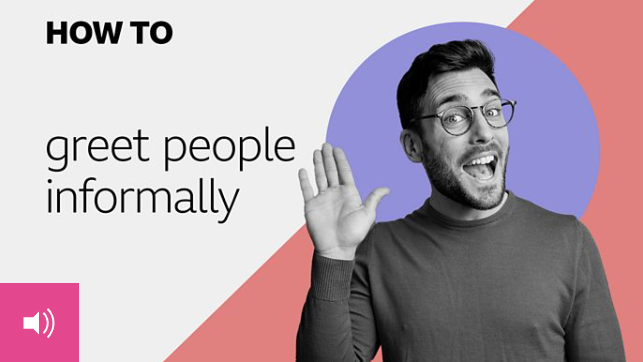Learn some of the most popular and useful expressions for greeting friends or other people in relaxed situations.
Jackie
Hello. Welcome to How To with me, Jackie Dalton. In this programme: how to greet people in informal contexts. There are lots of different phrases and expressions you can use and today you’ll learn some of the most popular and useful ones.
One of the first words you probably learnt in English was ‘hello’ – a very common way of greeting someone and suitable in both formal and more relaxed situations.
Now we’re going to hear some other expressions, and these are for informal situations. So here we go! Listen to this short clip of Matt saying hello to Jane. What word is used here instead of ‘hello’?
EXAMPLE
Matt
Hey Jane, how you doing?
Jackie
It was simply ‘hey’ – more informal than hello.
EXAMPLE
Matt
Hey Jane…
Jackie
It sounds a bit like ‘hi’, which you almost certainly used before as another slightly less formal version of hello. ‘Hi Jane!’ with H-I and ‘hey Jane!’ with H-E-Y. Both sound relaxed. Now, for our next greeting: what’s this one?
EXAMPLE
Jane
Alright Matt – how’s it going?
Neil
Alright Carrie! How are you?
Jackie
‘Alright’ – that’s very informal.
EXAMPLE
Neil
Alright Carrie! How are you?
Jackie
‘Alright Carrie!’ In England and Australia, you often hear it with ‘mate’ – an informal word meaning ‘friend’ which refers to the person you’re speaking to. ‘Alright mate!’ So, a reminder of our opening expressions for greeting so far:
Hello Richard!
Hi, Richard!
Hey Richard!
Alright Richard!
Alright mate!
So, you’ve said, ‘Hi,’ to someone. What next? Well, the normal thing, as in so many cultures, is to ask them how they are.
EXAMPLE
How are you?
Jackie
The most straightforward phrase: ‘How are you?’ But how else could you say that in a relaxed situation?
EXAMPLE
Hello Carrie – you alright?
Jackie
‘You alright?’ Of course the most correct way of saying this would be: ‘Are you alright?’ But it often just becomes, ‘You all right?’
EXAMPLE
Hello Carrie – you alright?
Jackie
And yes, you’re right, we just looked at ‘alright’ as another way of saying hello, but we also use it to ask how someone is. Now listen for another way to ask how someone is.
EXAMPLE
Hey Jane – how you doing?
Jackie
‘How you doing?’ Again, ‘How are you doing?’ would be more correct, but we often miss out the ‘are’ so it’s just: ‘How you doing?’
EXAMPLE
Hey Jane – how you doing?
Jackie
A variation on that, which you’re probably more likely to hear in Australia is: ‘How you going?’
EXAMPLE
Neil
Alright Carrie – how are you?
Carrie
Yeah, I’m fine Neil – how you going?
Jackie
‘How you going?’
EXAMPLE
How you going?
Jackie
‘How’s it going?’ is another form you might hear.
EXAMPLE
Alright Matt – how’s it going?
Jackie
So how could you respond when you’re asked how you are? One of the most common answers is: ‘Fine, thanks!’ But here are some more. All of them are quite informal.
EXAMPLES
Yeah – not bad, not bad.
Good, thanks!
Jackie
‘Not bad!’ which means quite good and ‘good, thanks!’ are both used here.
EXAMPLE
Yeah – not bad, not bad.
Good, thanks!
Jackie
You could also say, ‘Alright, thanks!’ or, ‘OK, thanks!’ or, ‘very well, thanks!’ So, to sum up those last expressions, we’ve got:
Not bad!
Good, thanks!
Alright, thanks!
OK, thanks!
Very well, thanks!
After you’ve answered that question, the most usual thing to do is to return the question and ask the other person if they are well, as in these examples.
EXAMPLES
Jane
Alright Matt – how’s it going?
Matt
Yeah, no trouble. How about you alright?
Jane
Yeah, not bad.
Matt
Hey Jane – how you doing?
Jane
Good thanks. And you?
Jackie
You can return the question with a simple, ‘And you?’ or, ‘How about you?’
EXAMPLES
Jane
Alright Matt – how’s it going?
Matt
Yeah, no trouble. How about you alright?
Jane
Yeah, not bad.
Matt
Hey Jane – how you doing?
Jane
Good thanks. And you?
Jackie
So now, a recap of the key phrases in this programme:
Hello!
Hi!
Hey!
Alright!
How are you?
How you doing?
How you going?
How’s it going?
You alright?
Good, thanks!
Fine, thanks!
Not bad, not bad!
Alright, thanks!
I’m OK!
And you?
How about you?
What about you?
